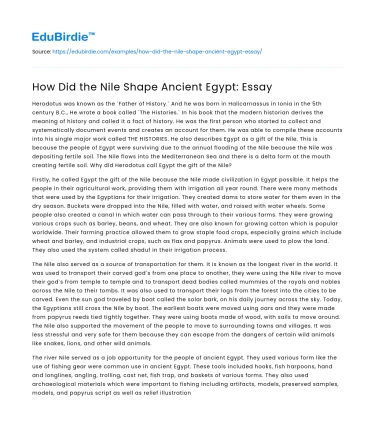Herodotus was known as the `Father of History.` And he was born in Halicarnassus in Ionia in the 5th century B.C., He wrote a book called `The Histories.` In his book that the modern historian derives the meaning of history and called it a fact of history. He was the first person who started to collect and systematically document events and creates an account for them. He was able to compile these accounts into his single major work called THE HISTORIES. He also describes Egypt as a gift of the Nile. This is because the people of Egypt were surviving due to the annual flooding of the Nile because the Nile was depositing fertile soil. The Nile flows into the Mediterranean Sea and there is a delta form at the mouth creating fertile soil. Why did Herodotus call Egypt the gift of the Nile?
Firstly, he called Egypt the gift of the Nile because the Nile made civilization in Egypt possible. It helps the people in their agricultural work, providing them with irrigation all year round. There were many methods that were used by the Egyptians for their irrigation. They created dams to store water for them even in the dry season. Buckets were dropped into the Nile, filled with water, and raised with water wheels. Some people also created a canal in which water can pass through to their various farms. They were growing various crops such as barley, beans, and wheat. They are also known for growing cotton which is popular worldwide. Their farming practice allowed them to grow staple food crops, especially grains which include wheat and barley, and industrial crops, such as flax and papyrus. Animals were used to plow the land. They also used the system called shaduf in their irrigation process.
Save your time!
We can take care of your essay
- Proper editing and formatting
- Free revision, title page, and bibliography
- Flexible prices and money-back guarantee
The Nile also served as a source of transportation for them. It is known as the longest river in the world. It was used to transport their carved god`s from one place to another, they were using the Nile river to move their god`s from temple to temple and to transport dead bodies called mummies of the royals and nobles across the Nile to their tombs. It was also used to transport their logs from the forest into the cities to be carved. Even the sun god traveled by boat called the solar bark, on his daily journey across the sky. Today, the Egyptians still cross the Nile by boat. The earliest boats were moved using oars and they were made from papyrus reeds tied tightly together. They were using boats made of wood, with sails to move around. The Nile also supported the movement of the people to move to surrounding towns and villages. It was less stressful and very safe for them because they can escape from the dangers of certain wild animals like snakes, lions, and other wild animals.
The river Nile served as a job opportunity for the people of ancient Egypt. They used various form like the use of fishing gear were common use in ancient Egypt. These tools included hooks, fish harpoons, hand and longlines, angling, trolling, cast net, fish trap, and baskets of various forms. They also used archaeological materials which were important to fishing including artifacts, models, preserved samples, models, and papyrus script as well as relief illustrations in the tombs and the temples walls of scenes showing fishing methods and craft from various Dynasties. The importance of fishing in the old Egypt economy was demonstrated by the exportation of their fisheries commodities and the importation of taxes on the fishing right and the development of the fisheries industry. Their type of processing fish included smoking where they smoke the fish using fire smoke. They also dry fish using direct sunlight and many more ways of preserving fish were discovered
The importance of fisheries in the economy of Old Egypt is demonstrated by the exportation of fish commodities and the imposition of taxes on fishing rights and the engagement of a large number of the population in the fish industry. Fish processing included drying, salting, pickling, fish cake, and fillet; various implements used were discovered. Till now other countries are still using the way of preserving fish which were used by the ancient Egyptians. The river provided various fishes of different varieties including Nile perch, tilapia, mullet, puffer fish, moonfish, mullets, carp, eels, elephant fish, catfish, and others.
Because of these important things the Nile river was giving off to the people of ancient Egyptians like food, job opportunities, transportation and all the good things it was providing that is why the Greek historian and traveler Herodotus in the fifth century B.C.E describe Egypt as a gift of the Nile.






 Stuck on your essay?
Stuck on your essay?

